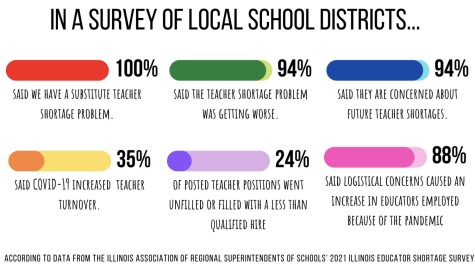Education majors and faculty: COVID-19 not only cause for teacher shortage
January 25, 2022

For the Regional Office of Education district #11, there has been a growing teacher shortage crisis for schools across Coles, Clark, Cumberland, Moultrie, Douglas, Edgar and Shelby counties.
In every county, the Illinois Association of Regional Superintendents of Schools, IARSS, has an annual survey to document current and recurring problems within school districts.
In a report, local school districts responded to the survey last semester these were some of the results:
- 35% said COVID-19 increased the teacher turnover.
- 94% said the teacher shortage problem was getting worse.
- 29 classes were canceled, and 14 became online due to the teacher shortage.
- 94% said they are concerned about future teacher shortages.
Bailey Reed, a sophomore secondary education biology major, said she thinks the conditions teachers are in is causing the shortage in teachers in America.
“I believe the conditions for teachers is the cause for the shortage of teachers in America overall,” Reed said. “Generally the pay starting off isn’t phenomenal, but is getting better as the baseline pay is getting raised (at least in Illinois). Also, teaching can really be a stressful job. As a teacher, you are there for the students more than anything else. You are your student’s safe place, and sometimes that means you have to handle some of those stressors with them and help them through it. And that’s hard. It can get to you, which is why a lot of teachers leave after 5 years.”
Reed also said whether or not COVID-19 was the cause for the teacher shortage facing the district right now.
“I mean, the teacher shortage has been an issue since before COVID made its way into our lives, especially in Illinois, but I have no doubt that it’s made the shortage worse,” Reed said. “I know of many teachers from my hometown who retired early or quit as a result of the pandemic. Many teachers did it because of their own health or a family member’s health.”
Reed said her thoughts on COVID-19 was a catalyst for the shortage or if it was inevitable.
“We were already at a point of crisis in many states,” Reed said. “In Illinois, there are plenty of classrooms that have to go on without a certified teacher guiding the class, but I do see the pandemic as catalyzing the crisis.”
Reed brought up how COVID-19 is a stressful situation for teachers.
“Teachers are constantly testing positive for COVID putting more stress on them as well as their colleges and administration,” Reed said. “Many administrators, teachers and other specialists are expected to step up and act as substitutes during their lunches and planning periods.”
Leah Moreland, a junior elementary education major, said what she believes is causing the teacher shortage, a lack of support and resources.
“I think that the shortage is due to teachers not receiving the support and resources that they need,” Moreland said. “During the pandemic, parents were beginning to realize that teachers are so much more than ‘babysitters,’ but over time we have lost that respect again.”
When talking about what is causing the shortage, Moreland said how she thinks COVID-19 has affected the shortage.
“I think COVID only helped the situation along,” Moreland said. “Teachers were treated unfairly before the pandemic. It simply put everyone in a difficult situation that could’ve been positive or negative. Yes, COVID put teachers and administrators in impossible situations, but teachers were always disrespected and downplayed before the pandemic.”
Jonathan Carley, a freshman music education major, said they think a lack in pay is causing the shortage crisis.
“I think the main reason we as a nation are experiencing such a shortage of teachers in today’s world is because of the pay rate,” Carley said. “Teachers in America are overworked and underpaid. As a teacher, we’re expected to work the normal 7:30 to 4:30 day, go home and grade papers for 135 students (numbers from my high school). Grading, lesson planning and activity prep bleeds into the weekend. Therefore, most of the time you’re working seven days a week to make roughly $45k per year.”
Carley said how COVID-19 is also a factor in the teacher shortage.
“I think COVID is definitely a factor to the teacher shortage, on top of the pay rate, and safety precautions, or lack thereof,” said Carley. “A lot of school districts are currently on strike because of this.”
Carley said whether COVID-19 was the catalyst for the shortage, or if the shortage was always going to be a problem one day.
“I think depending on the area; the teacher shortage was definitely inevitable,” said Carley. “Until the previously mentioned conditions are improved, we will have a shortage in educators. However, I think that Covid gave a lot of teachers a perfect time to leave. If there was no pandemic, I think we would have still had the teacher shortage.”
Christy Hooser, Eastern professor of special education, said COVID-19 didn’t cause the shortage of special education teachers, the shortage started years before the pandemic.
“COVID did not start the teacher shortage,” Hooser said. “There has been a shortage of special education teachers across the nation since I started at EIU in 1990. Shortage areas have been added since then, but not because of COVID.”
Hooser said the bigger problem isn’t the shortage, but how the shortage can be addressed and solved.
“COVID continues to increase the stress already felt by teachers resulting in burnout and teacher attrition,” Hooser said. “The true question is: How can we address the shortages in a quality manner and how long will it take to rebound? Without those answers, I am afraid our ability to be responsive to schools will be minimal.”
Julie Viertel, an Eastern academic advisor for the department of teaching, learning and foundations, said the teacher education enrollment numbers and the number of teachers retiring doesn’t equal out, which is part of what is causing the shortage.
“Teacher Education enrollments decreased years ago because of these disincentives,” Viertel said. “ Now, many teachers are retiring and there are not enough certified teachers to take their place.”
“A large number of teachers were at or near retirement age,” Viertel said. “Since COVID has put more stress on teachers, more teachers are retiring early or switching careers. The tight labor market also gives teachers more options to switch careers.”
Ellen Dooley contributed to this article.
Madelyn Kidd can be reached at 581-2812 or at [email protected].



















































